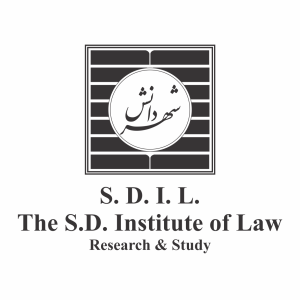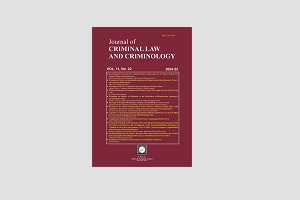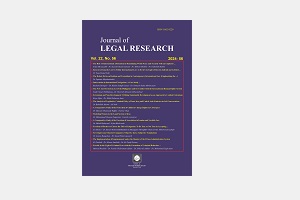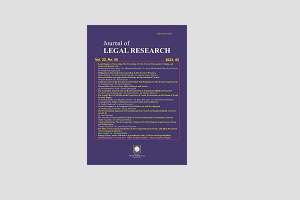Journal of
Legal Research
Number 13
Vol. VII No. 1
Spring – Summer 2008
Managing Editor: Vahid Eshtiagh
Editor-in-Chief: Seyyed Ghasem Zamani
CONTENTS
Articles
The Need for Improvement of Buy Back Contracts in Iran’s Oil Industry
Behrooz Akhlaghi (Ph. D.)
UNSC Resolution 1835: Its Bases and Perspectives
Nader Saed (Ph. D.)
Exclusion Clauses in Personal Insurances
Mohammad Reza Manoochehri
Human Rights and Criminalization Holocaust Denial: Conflict or Compatibility?
Mohammd Ghorbanpour
Nuclear Incident and Principles of Civil Liability
Feizollah Jafari
Prohibition of the Use of Force and the South Ossetia Crisis
Pars Institute for International Law
Special Issue: Legal Protection
of Persons with Disabilities
Change of Discourse: People with Disabilities and the Contemporary Human Rights
Seyed M. Ghari S. Fatemi (Ph. D.)
Reflections on “Iranian Comprehensive Code for Protection of the Disabled Persons” in the Light of Regulations of “Convention on the Rights of Persons with Disabilities”
Elham Yoosefian
The Right of Children with Disabilities to Education in Iran: Necessity of Accompaniment with International Developments
Ali Rezaee & Mostafa Elsan (Ph. D.)
Mechanisms to Protect “The Right to Work” of Persons with Disabilities in the Iranian Legal System and International Human Rights Documents
Shahram Zarneshan
Protection of Persons with Disabilities in Armed Conflicts
Pouria Askary
Reflections on Protection of the Rights of People with Disabilities in European Community
Seyed Ghasem Zamani (Ph. D.)
European Court of Human Rights and Appropriate Prison for Persons with Disabilities
Hasan Moradzadeh (Ph. D.)
Critique: The Draft of Iranian Penal Code
A Pathology of the Draft of Islamic Penal Code in the light of Speech Rationality
Ghasem Mohammadi
The Place of Victim in the Draft of Islamic Penal Code (A Victimological Analysis on Articles 111-1 to 166-2)
Mehrdad Rayejian Asli (Ph. D.)
Criminal Responsibility of Legal Persons in the Draft of Islamic Penal Code
Vahid Eshtiagh (Ph. D.)
Some Reflections on Permission in Quesas
M.J. Shariat Bagheri (Ph. D.)
Articles
The Need for Improvement
of Buy Back Contracts in Iran’s Oil Industry
Behrooz Akhlaghi (Ph. D.)
Abstract:
As a legal institution, the so called “buy back contract” play a significant role in the field of gas and oil transactions of our country for more than 15 years. Since its practical introduction, there has been a kind of ambiguity and secrecy with this new legal institution. Such an ambiguity and the secrecy seems to be the main obstacle for an appropriate and objective critical analysis of these contracts by academician, as well as other experts. The main task of this article is to offer certain suggestions and solutions to improve of buy back contract in Iran by shedding some lights on their shortcomings.
Keywords: Buy Back Contract, Oil Industry, Gas and Oil Transactions, Iran’s Oil Industry
UNSC Resolution 1835: Its Bases and Perspectives
Nader Saed (Ph. D.)
Abstract:
Unjust reactions of the IAEA Board of Gevernors and the Security Council (SC) to the Iran’s nulcear program and activities during 2003-2008, have been endangered some established rules of international law. Prevailing the political motives of some permanent members of the SC over the relevant international treaties and inalienable and sovereign rights of states to development, and understimating the positive effects of the iran’s cooperations on the resolution on Outstanding Issues are the core (but non-legal) bases and raison detre of the present crisis in this case.
This Article analyzes the SC Res. 1835 (2008), and unwilings (even ultra vires) in the practice of the IAEA’s Sectratriate and the SC, in the light of international law.
Keywords: the Security Council, Iran’s Nuclear Program, Reolution 1835, International Law, International Peace and Security
Exclusion Clauses in Personal Insurances
Mohammad Reza Manoochehri
Abstract:
Insurance companies may be exempted from their legal and fanatical obligations in certain incidents. An insurance contract also may contain some exclusion clauses. There are two types of excluding clauses: those which can be modified later via the parties’ agreement, so the insurance policy may cover some of the excluded incidents; and incidents which can not be legally covered in any case. This article undertakes to discuss legal aspects of different types of the excluding clauses in personal insurance contracts.
Keywords: Insurance Policy, Exclusion Clauses in Insurance Contract, Insurance, Personal Insurance, Insurance Contracts
Human Rights and Criminalization
Holocaust Denial: Conflict or Compatibility?
Mohammd Ghorbanpour
Abstract:
In criminalizing Holocaust Denial, as a kind of limitation on Freedom of Expression, always there is a question: is this attitude towards denying a historical fact in accordance with the human rights standards? Freedom of Expression has a fundamental role in democratic countries. It is also effective in benefiting from other human rights. When we take into account the population structure, culture, history and civilization of countries, we understand that social changes have a principal role in shaping social needs and these social changes and needs have a strong effect in legislation. Criminalization of Holocaust Denial in some societies is based upon legitimate aims, such as protection of others’ rights, public order, security and responsibility to protect against genocide. Meanwhile we believe that Criminalization of Holocaust Denial is not always based on the aforementioned legitimate goals and in fact it is affected by political factors.
Keywords: Freedom of Expression, Holocaust Denial, Genocide, Racial Discrimination, Hated Speech, Human Rights
Nuclear Incident
and Principles of Civil Liability
Feizollah Jafari
Abstract:
Development and change in science and technology and continuous advent of modern industries, is the most important factor of change and development in tort law. Atomic energy industry, in this respect, has had a main effect. Special nature of the nuclear activities and unique characteristic of nuclear damage is in manner that the general principles of civil liability can not answer its particular problems. Thus it needs a special regime governing these questions. Such regime has been accepted in many countries having nuclear industry and also in various conventions in international level. The special regime of nuclear civil liability has, vis-à-vis most of general principles of tort law, a particular rule. Such principles as strict liability, channeling of liability to operator, limitation of liability, compulsory financial security (insurance), state intervention in compensation and unity of competent court, are amongst nuclear civil liability principles. This regime is, also in elements and effects of liability, of special rules. There is no particular law in respect of nuclear civil liability in our country. Therefore, the special regime has not come to our legal system. Neither general rules of civil liability can meet modern necessities and exigencies with respect to nuclear questions. Therefore, Iranian legal system, in respect of questions relating to nuclear liability, is deficient.
Keywords: Civil Liability, Nuclear Incidents, Compensation, Special Regime
Prohibition of the Use of Force
and the South Ossetia Crisis
Pars Institute for International Law
Abstract:
The fight between Russia and Georgia over separatists South Ossetia in August 2008 (known as the South Ossetia crisis) once again highlighted the significance of the principle of the prohibition of the use of force outlined in the Charter of the United Nations. This article examines legality of Russia’s claim to protect its nationals’ right of self-determination by using its military force. We will also discuss reactions of other states as well as the UNSC to the Russia’s military intervention.
Keywords: Use of Force, Georgia, South Ossetai, Self-determination, UN Security Council, Genocide, Self-defense
Change of Discourse: People with Disabilities
and the Contemporary Human Rights
Seyed M. Ghari S. Fatemi (Ph. D.)
Abstract:
The main task of this article is to demonstrate materialization of a new trend in international legal system concerning rights of persons with disabilities. International community seems to distance itself from a mercy-based protection of individuals with disabilities. While realizing their differences, international community has created a kind of egalitarian framework to provide these individuals with equal rights and opportunities. By providing these persons with a set of negative and positive rights, “the UN Convention on Rights of Persons” with Disabilities represents what I call it “change of discourse”. Yet, in order to shed some lights on the content of this new humanistic approach, conceptual analysis of the term disability, as well as theoretical foundation of their equal treatment are in need of serious discussion, which this article undertake the task.
Keywords: Disabilities, Change of Discourse, Human Rights, UN, Equal Opportunities, Equal Treatment
Reflections on “Iranian Comprehensive Code for Protection of the Disabled Persons”
in the light of Regulations of
“Convention on the Rights of Persons with Disabilities”
Elham Yoosefian
Abstract:
The purpose of this article is to compare the provisions of the “Iranian comprehensive code for protection of the persons with disabilities” adopted in 2004 with the international criteria reflected in the international convention on the rights of persons with disabilities entered into force in 3 May 2008. This comparison proves a number of changes necessary.
Recognition of equal civil and political rights for persons with disabilities, prohibition of any kind of discrimination on the basis of disability, establishment of independent mechanisms for implementation and monitoring and giving more consideration to awareness-raising are the most important points which should be taken into account in the next legislative measures.
Keywords: Iranian Comprehensive Code for Protection of the Disabled Persons, International Convention on the Rights of Persons with Disabilities, Non-Discrimination, Awareness-Raising, Mechanisms for Implementation and Monitoring
The Right of Children with
Disabilities to Education in Iran: Necessity
of Accompaniment with International Developments
Ali Rezaee
Mostafa Elsan (Ph. D.)
Abstract:
Realization of rights offering children with disabilities equal opportunities is an important issue. The purpose of this article is to examine these rights in both national and international law, and thus statutes to propound certain constructive suggestions to the national legislator. A comparison of the Iranian legal system with international documents and the U.S law demonstrates the necessity of certain reforms in the field of educational rights of children with disabilities. Although “the Iranian Comprehensive Act for Protection of Persons with Disabilities”, provide these people certain human rights, still in regard to their educational rights the Act is in need of some modifications.
Keywords: Children with Disabilities, Right to Education, Citizenship Rights, International Documents, Law of Iran, US Law
Mechanisms to Protect “The Right to Work”
of Persons with Disabilities in the Iranian Legal System and International Human Rights Documents
Shahram Zarneshan
Abstract:
As an important right, right to work is supported by international human right documents, as well as the Iranian legal system. As to the persons with disabilities, due to their special conditions, adopting appropriate protective policy is considered for equal access to employment situations. In this respect, convention on the rights of persons with disabilities indicates that States Parties recognize the right of persons with disabilities to work, on an equal basis with others; this includes the right to the opportunity to gain a living by work freely chosen or accepted in a labor market and work environment that is open, inclusive and accessible to persons with disabilities. This article deals with “the right to work” in the above mentioned convention and other international instruments. In addition, this article will examine the Iranian legal system in regard to right to work and employment of persons with disabilities.
Keywords: The Right to Work, Persons with Disabilities, Employment, Human Rights, Social Justice
Protection of Persons with Disabilities
in Armed Conflicts
Pouria Askary
Abstract:
Persons with disabilities make up the world’s largest and most disadvantaged minority. This special group of vulnerable people is in need of special protection to continue their life.
The UN Convention on the Rights of persons with Disabilities ensures that the world’s largest minority enjoys the same rights and opportunities as everyone else. It covers the many areas where persons with disabilities have been discriminated against in peacetime. It also insists on special respect and protection of persons with disabilities in times of armed conflicts according to the rules and customs of international law. According to the Law of Armed Conflicts or International Humanitarian Law (IHL), the disabled and infirm affected by armed conflict are entitled to special respect and protection, Armed Conflicts.
Keywords: Persons with Disabilities, International Humanitarian Law, Specific Protection
Reflections on Protection of the Rights
of People with disabilities in European Community
Seyed Ghasem Zamani (Ph. D.)
Abstract:
Founding member States set the European Community an economic task, that of realizing a common market, which excluded almost all social and fundamental rights, based competencies. Persons with disabilities, along with other vulnerable groups, were overlooked in this master plan. However fifty years on the situation has changed, albeit not drastically. There is a far greater awareness of disability issues within the Community institutions, and indeed within the member States. The European Community has gained some competencies in the field of social policy, and has taken some tentative steeps to establish a Community disability policy.
Keywords: European Community, Disability, Persons with Disability, European Union, Council of Europe, Human Rights
European Court of Human Rights
and Appropriate Prison for Persons with Disabilities
Hasan Moradzadeh (Ph. D.)
Abstract:
“The European Convention on Human Rights and Fundamental Freedoms” do not directly provide persons with disabilities with particular rights. Nor does it lay down specific standards to treat individuals in jail, be them with or without disabilities. Nevertheless, the fact remains that imprisonment of persons with disabilities without taking into account their particular conditions in their jail may lead to violation of article 3 of the European Convention, according to which “no one shall be subjected to torture or to inhuman or degrading treatment or punishment”. The practice of the European Court of Human Rights in regard to suitability of a prison for persons with disabilities is the main focus of this article.
Keywords: Prison, European Convention on Human Rights, Persons with Disabilities





